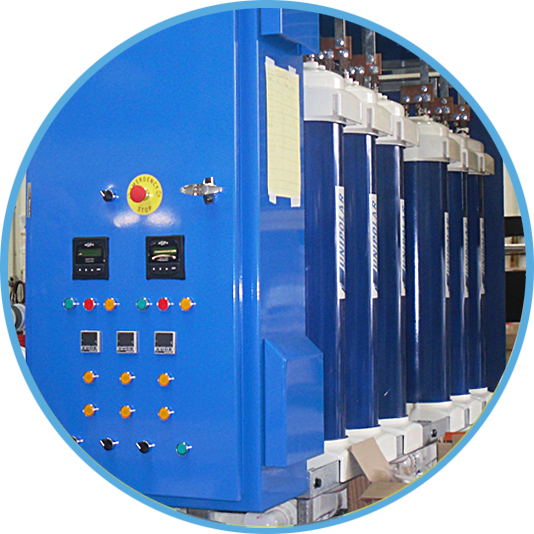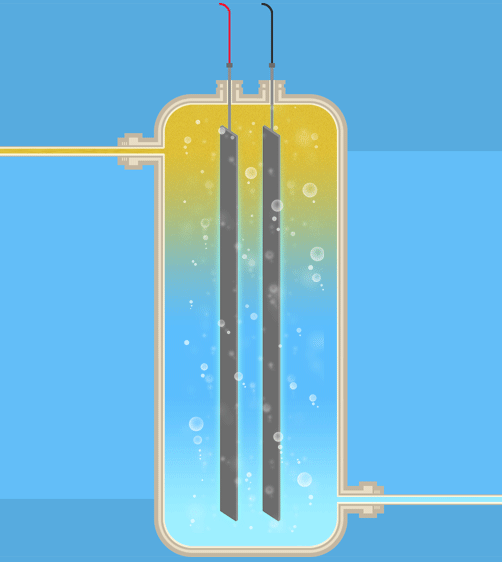New Commercial Patented Process

Unipolar® water disinfection technology is a newly patented electrochemical system that uses an innovative electrolysis system to generate powerful oxidants from compounds found in wastewater.
These oxidants effectively destroy pathogens, chemicals and pharmaceuticals cost-effectively and without compromising safety or the environment.
Superior Performance
Electrochemical process delivers more effective and safer water treatment. Membrane-free technology reduces downtime and running costs.
Safer
No chlorine or hazardous chemicals are added with the Unipolar® system, eliminating the need for transport, storage or handling of dangerous materials. Hydrogen produced by the electrolysis is safely vented and the user-friendly operator interface offers greater safety as most functions can be automated.
Cheaper
Unipolar® is very cost efficient to operate and maintain* as:
- power consumption is low;
- the system runs at ambient temperatures and low pressure;
- cleaning is automated and does not require chemicals or service water; and
- very short cleaning cycles minimise downtime.
Cleaner
Unipolar® can produce Class A recycled water. It can remove hydrocarbon chemicals and pharmaceuticals (such as oestrogen, which can affect aquatic wildlife fertility). Impurities such as phosphates (a cause of algal bloom) can also be removed.
More Powerful
Electrochemical disinfection is highly effective compared with existing methods. Unipolar® electrolysis is designed to generate powerful oxidants (including free chlorine, ozone, hydrogen peroxide and hydroxyl radicals) which are finely dispersed in the electrolysed water and can destroy bacteria, viruses and protozoa.
See illustration below:
Fresh E.coli bacteria, viewed through an electron microscope:
* Depending on water quality and level of disinfection, typical power consumption is as low as 1.0-1.5kWh/kL for wastewater recycling, even less in other applications.
Treatment
↓ After
Fresh E.coli bacteria, viewed through scanning electron microscope.
After conventional chlorination.
* Depending on water quality and level of disinfection, typical power consumption is as low as 1.0-1.5kWh/kL for wastewater recycling, even less in other applications.
Membrane-Free Technology
Unipolar's unique patented design eliminates the membrane used in conventional electrolytic cells and incorporates an innovative electrical circuit and control system.
The result is a new system with
Valuable Performance Improvements
- Increased biocide production (both anode and cathode cells)
- Weakened pathogens resistance to disinfection;
- Increased efficiency;
- Lower ionic polarisation;
- No membrane maintenance required;
- Tolerant to turbidity and suspended solids;
- Continued disinfection after treatment;
- Simple integration into existing water treatment facilities;
- Scalable capacity; and
- A compact system and installation.
Membrane-Free Technology
Unipolar's unique patented design eliminates the membrane used in conventional electrolytic cells and incorporates an innovative electrical circuit and control system.

The result is a new system with
Valuable Performance Improvements
- Increased biocide production (both anode and cathode cells)
- Weakened pathogens resistance to disinfection;
- Increased efficiency;
- Lower ionic polarisation;
- No membrane maintenance required;
- Tolerant to turbidity and suspended solids;
- Continued disinfection after treatment;
- Simple integration into existing water treatment facilities;
- Scalable capacity; and
- A compact system and installation.
Multiple Applications
Unipolar®'s economical, safe and scalable attributes make it competitive in many processes requiring the treatment of water. The Unipolar® development team is also available to work with clients to design custom solutions to suit specific demands and needs.
